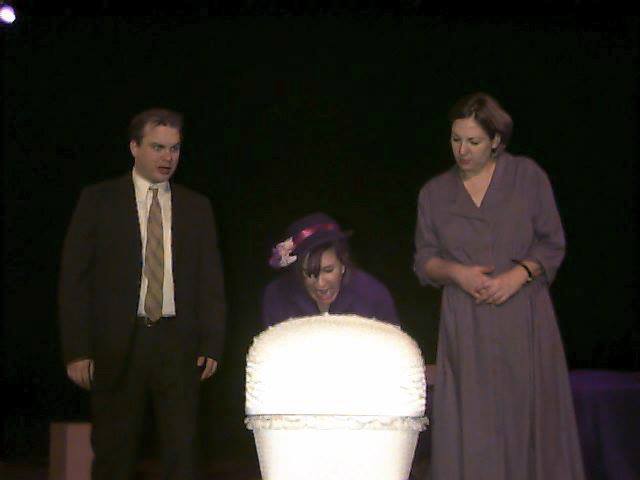1999. “The Baby with the Bathwater.” Playwright: Christopher Durang. Directors: Anthony Runfola, David Vining. Cast: Kay Kirby, Will Hare, Benjamin Monrad, Maggie Fleck, Kathleen Butler Gravatt.

* Review by Kyle Lawson, Arizona Republic, Jan. 14, 1999.
Christopher Durang wrote Baby With the Bathwater in 1983. Back when the dinosaurs ruled the Earth. Well, a long time ago, anyway. It’s a fast-paced world out there, kiddo; lots of folks define ancient history as a rerun of Friends.
You’d think Baby would be sprouting whiskers down to its ankles by now.
Maybe not, if you were in Saturday’s sold-out audience for the Ensemble Theatre revival of the (stinging, flagellating, self-abusive, all of the above) comedy by the man who says his greatest claim to fame is that Sigourney Weaver once considered having sex with him. (Did she? He doesn’t tell that part!)
People were making the funniest sound Saturday night. Let me see if I can duplicate it. GASP! There, that’s it. You could hear it all over the auditorium.
Audacity, thy name is Durang. Baby is a cold-bloodedly acerbic chop to the neck of well-meaning but incompetent parents. The acid may have been festering on the ax for 16 years, but it has lost none of its potency. Saturday, it was corroding guilt complexes left, right and front-row center.
Some were fighting back. A couple of parents were drumming up a lynch mob in the lavatory. In the lobby, child psychologists and educators were filling out applications for hit men.
Onstage, Helen and John were having a nuclear moment. They admire their newborn, they just aren’t sure what to do with it.
“It.” They call it that for most of the opening scene. They aren’t sure of its sex, you see, and they wouldn’t think of intruding on its privacy. Surely, they change the brat’s diapers. Maybe not.
Finally, they name “it” Daisy and rush out to buy some dresses.
So, Daisy’s a boy. That’s only the first of his problems.
Daisy’s childhood is traumatic. There is the Mary Poppins from hell, a nanny who is more interested in bedding daddy than rocking baby to sleep. And there’s the woman who wanders in from the street with her rabid German shepherd. She had a child of her own, but she left it on the floor of her apartment while she went out to buy baby food and dog biscuits, and the pooch ate it (the baby, that is).
She steals Daisy, but her plot is thwarted when she falls under the wheels of a bus. The dog follows her. Daisy survives. There is more of this, including Daisy’s playground adventures and his/her experiences as a misunderstood high schooler, the world’s oldest college sophomore and a perpetual visitor to the psychologist’s office.
Daisy considers killing his parents, then decides on suicide. He keeps throwing himself under the wheels of a bus. This time, the bus keeps missing.
Co-directors Anthony Runfola and David Vining stage all this in a style that approaches Samuel Beckett at some points and stoops to Marx Brothers goofiness at others. The satire is cruel, bitter, appalling – pick an adjective – and very, very funny.
The cast, including Kay Kirby as Helen, Will Hare as John and Maggie Fleck in a number of smaller roles, does well by the material. Kathleen Butler does much better than that as the demented nanny, a playground mom and a sexually confused high school principal. If you don’t think an intercom is the funniest prop ever invented, you haven’t seen Butler in action.
Benjamin Monrad’s Daisy (played by dummies in the first act, no slur intended) shows up wearing a dress and five o’clock shadow. It’s the highest compliment to say the young ASU actor lives up to his character’s billing. He makes Daisy’s transition from victim to active participant in life not only appealing but believable, no small feat considering what Daisy has to overcome.
Durang has a moral to his madness. You don’t have to be the child your parents made you. You can take control of your fate. The play ends with Daisy and his wife, Susan, cooing over the crib of their newborn.
Will history repeat itself?
Buy a ticket.